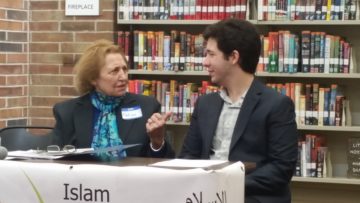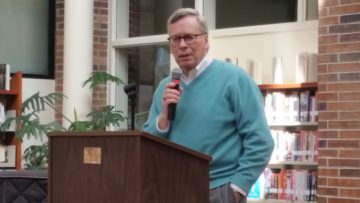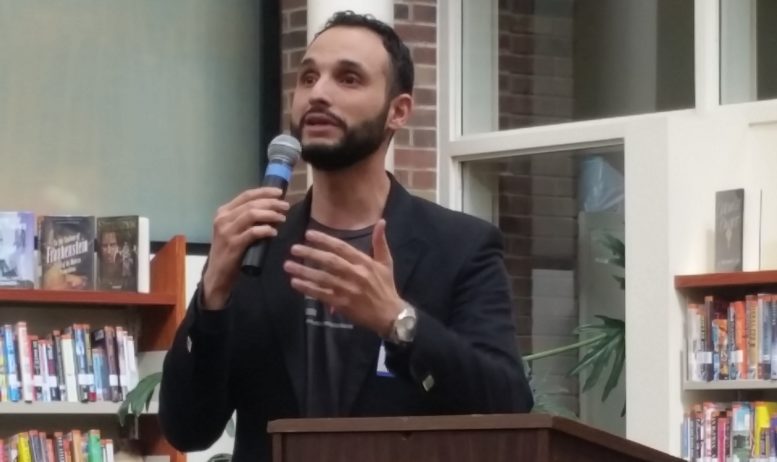By JAN LARSON McLAUGHLIN
BG Independent News
Some bridges were strengthened Sunday between local Muslims, Christians and Jews.
The ravine between Muslims and other faiths in America has grown during the past year – emphasizing the differences rather than the similarities between people of varying faiths.
So on Sunday, Muslim students from Bowling Green State University, asked the community to join them for a “Meet the Muslims” gathering at the Wood County District Public Library.
“This is how it starts,” a Muslim student said, pointing out that both Islam and Christianity promote love for others. “We are all brothers and sisters in humanity. It’s on us to get to know one another.”
Adnan Shareef, president of the Muslim student group, said that stereotypes are allowed to fester and grow if nothing is done to stop them.
“All of us are affected by stereotyping,” Shareef said. “Unless we communicate and interact with people. Through interaction, stereotypes can change.”
In the current political climate in the U.S., the community gathering was a serious undertaking for students of the Muslim faith.
“It takes a lot of courage,” said Marcia Salazar Valentine, executive director of the BGSU International Programs and Partnership.
But the students were not alone, reminded Bowling Green City Councilman Daniel Gordon.
“Events like this today are needed now more than ever,” Gordon said, speaking of the “venom of Islamaphobia” being spread since the presidential campaign and election. He spoke of the growing number of hate crimes targeting Muslims, and the travel ban executive order signed by President Donald Trump.
“This is not our America,” Gordon said. This has become a nation where hateful campaign rhetoric is turning into national policy.

Fatima Al-Hayashi talks with Daniel Gordon at “Meet with Muslims” event.
This isn’t the first time refugees have been turned away at America’s borders, he said. In 1939, many Jewish refugees coming into America were refused entrance. So Trump’s signing of his travel ban on Holocaust Remembrance Day was particularly hurtful, Gordon said.
“America, after all, was built by immigrants and refugees,” he said. “We need to stand together.”
Bowling Green City Council has taken action to stand up for Muslims, with the passage of a resolution condemning hatred toward Muslims and proclaiming that silence in the face of intolerance is not acceptable.
“This is the heart of who we are,” said Gordon, who presented members of the BGSU Muslim Student Association with a framed copy of the city resolution.
Fatima Al-Hayashi said she is troubled by the recent political climate in the U.S., but she has not lost faith.
“I have faith in the American public,” Al-Hayashi said, noting the millions of people protesting the travel ban. “I don’t have faith in the government. I do have faith in the Constitution.”
Al-Hayashi, who teaches at the University of Toledo, came to America from Lebanon.
“Once I studied the Constitution, I fell in love with America,” she said.
Al-Hayashi found it to be a country of acceptance – which is so much more than just tolerance. “Words are important,” she said.
Al-Hayashi pointed out that gatherings like Sunday’s give her further faith.

Mayor Dick Edwards talks at Muslim community event.
Bowling Green Mayor Dick Edwards said City Council is taking another step on Monday when a resolution will be discussed proclaiming Bowling Green as a welcoming city to people of all nationalities and faiths.
“Our differences bring us together,” Edwards said. And the similarities are often greater, he said, noting the common theme of “The Golden Rule,” in most faiths, encouraging people to treat others as they would like to be treated themselves.
Edwards noted the city’s other effort this week, hosting the third annual Interfaith Breakfast on Wednesday morning. “It’s a sincere effort to bring people together of all faiths.”
Rev. Gary Saunders, community chairman of the Not In Our Town organization, spoke of how that group became the “voice of Bowling Green,” when hatred bubbled up a few years ago. The community “views diversity as an opportunity, not a problem,” he said.

